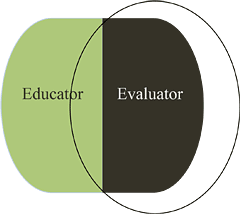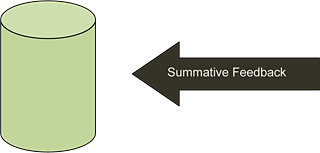Objective 4: Methods of Evaluation of the IPE Component of and IPE Placement
Evaluator Role
“The ultimate measure of a man is not where he stands in moments of comfort and convenience, but where he stands at times of challenge and controversy.” (Martin Luther King Jr.)

But what can I provide feedback on?
As a clinical educator your may feel that your primary role in evaluation is focused on profession specific competencies. While these are critical, part of the IP learning objectives must involve common collaborative competencies that all team members are working towards. Your role in evaluation therefore is to provide:
- Formative evaluation
- Summative evaluation
to foster competent collaborative professionals.
What are Common Competencies?
There is ongoing work at establishing a set of common collaborative competencies among health disciplines. While there are no universally agreed upon IPE competencies. Like professional specific competencies, The College of Health Disciplines at UBC (2008) has proposed three common competencies of inter-professional collaboration.
These will help you identify the skills that you will evaluate both in your discipline specific student and the other students in the CLU.
Formative and Summative Assessment
Formative assessment in an IPE placement is the process of providing feedback to all students over the course of the clinical placement to shape and guide learning about interprofessional collaboration. Formative assessment is for learning and can include:
- Immediate feedback to the student following a clinical encounter (i.e. team meeting, assessment)
- Use of questions to students from other disciplines
- Presentation of a hypothetical IP situation or case scenario
- Interprofessional discussions on a specific issue, case, ethical dilemma
- End of day summary of IP collaborative competencies

The important aspect of formative assessment is feedback. Feedback on the IP collaborative practice competencies should be provided by many different preceptors to reinforce collaborative practice skills.
Much has been written on feedback. Here are some excellent e-resources that you can go to for detailed information:
Interprofessional Collaborative Competencies (UBC, 2008)

BC Competency Framework for Interprofessional Collaboration
Summative assessment is the assessment of learning that occurs at the end of period of learning. In clinical placements this represents the final evaluation document that each profession must complete. While each profession will have a different document or evaluation tool specific to their discipline, there will be a number competencies that will overlap with the IP collaborative competencies identified by UBC (2008).

How can the CLU and preceptors be involved in summative assessment of other students on the CLU?
- Individually provide the discipline specific preceptor with examples of the student’s performance on the UBC IP Collaborative Competencies (2008).
- Have a formal team meeting to discuss the IP collaborative competencies of each student on the CLU.
- Host a Team Objective Structured Clinical Examination (TOSCE) (Taylor et al, 2004)
- This requires at least 3 students from different professions to be completing a placement at the same time.
- The TOSCE is based the Objective Structured Clinical Examination (OSCE) (Harden and Gleeson, 1979), but the process occurs with a team rather than an individual.
- Each team spends 20 minutes on an case problem, with a another 5 minutes spent assessing their performance as a team. At least two preceptors would use a checklist to independently score the team's performance.

